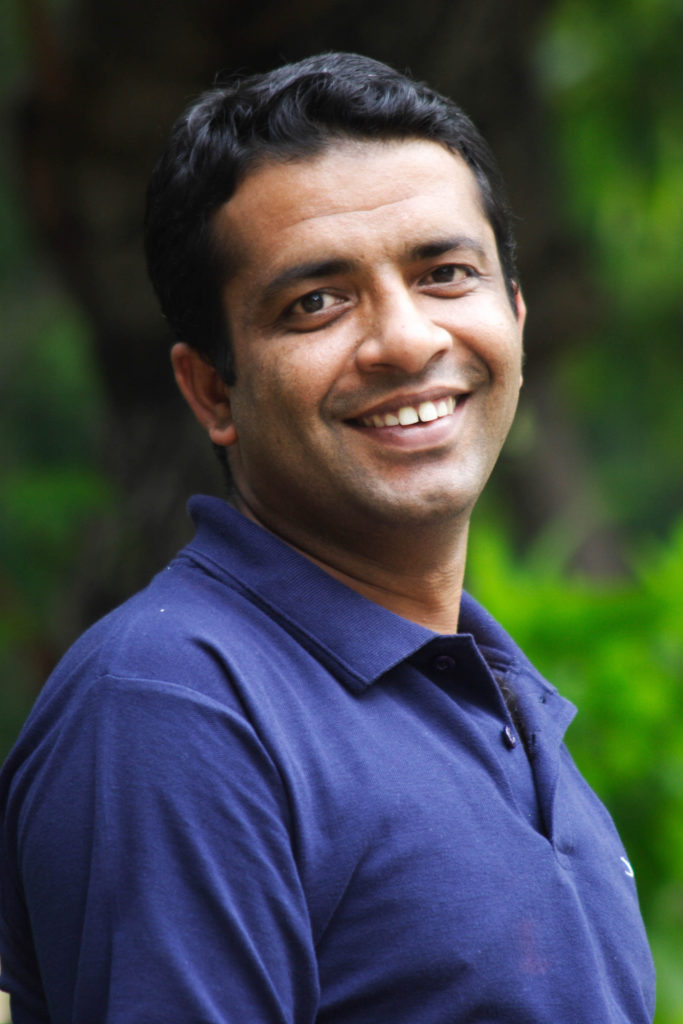
Anshu Gupta is an Indian social entrepreneur who founded Goonj, a Delhi-based NGO that positions the under-utilised urban material as a development resource for the rural parts of India. Anshu won the Ramon Magsaysay Award in 2015, for “his creative vision in transforming the culture of giving in India, his enterprising leadership in treating cloth as a sustainable development resource for the poor, and in reminding the world that true giving always respects and preserves human dignity.”
Describe yourself in one word. What is your biggest strength and one weakness?
I am a doer and a very open person. I believe in lots of experiment. Weakness? I do delay in responding to certain things. I can come up with logics behind that given my hectic travel etc. but I think it needs to change.
When we talk about the development agenda, clothing is not featured. It is not considered an issue. Why is that the case? How big of a problem is clothing?
To be honest, the size of the problem is almost unimaginable now. We do not need any fresh research for this. The day you say that half the world does not get 2 meals a day, or half the country is homeless, huge figures come up. You need to understand that the person who does not have 2 meals a day is eventually going through the acute problem of this issue too, whether it is clothing, sanitary pad, or anything to do with cloth or other material.
Ignorance on the issue of clothing is big. The biggest fulfilled, unfulfilled Millennium Development Goals (MDGs) or now the Sustainable Development Goals (SDGs), even country-wide or local level planning all have 100-150 issues from domestic violence to global warming, but nothing on clothing as a subject. Answer to why that is the case is extremely tough. I too am looking for an answer to that question. Somewhere a small justification to that is that people like us who create policies and goals and decide on agendas, have felt hunger if we do not get lunch after breakfast, we must have felt homelessness, if you go to to a new city and do not find a hotel to stay in, but maybe none of us has ever gone out without a piece of cloth in public. I personally have never faced this problem. Maybe that is why we do not understand the problem of clothing to consider it an issue. Although it is funny to accept that we have to go through all the problems we want to solve!!
Apart from Goonj, do you know of any other organizations working on clothing?
Lots of people across the world work with cloth and other second hand material but just like a charity where they collect and distribute. Most of the countries ultimately have some system like that, where they collect from the people, take out the first level good material to sell it off again through shops and thrift shops, and B/C grade is transferred to the poorer people. Our model is not just pure giving or charity but basically using that material as a resource or currency and we make sure that A grade material goes to people and B and C grade material is used in other things. Through our ‘Cloth For Work’ campaign you get cloth and other material in a very dignified way. To the best of my knowledge this model has not being replicated yet by anyone else. Normal charitable work around cloth is very common.
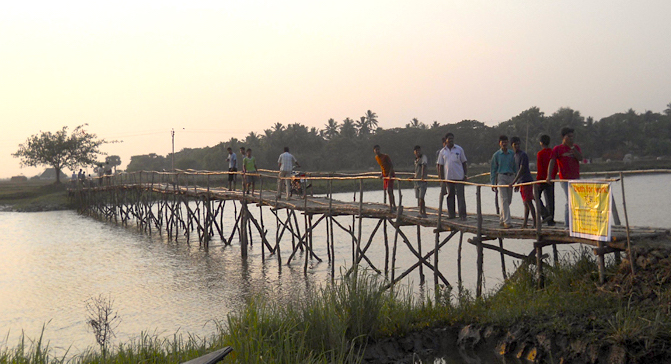
Construction of Bamboo Bridge in Orissa under Goonj’s ‘Cloth for Work’ initiative which compensates villagers for their labor in the form of clothes
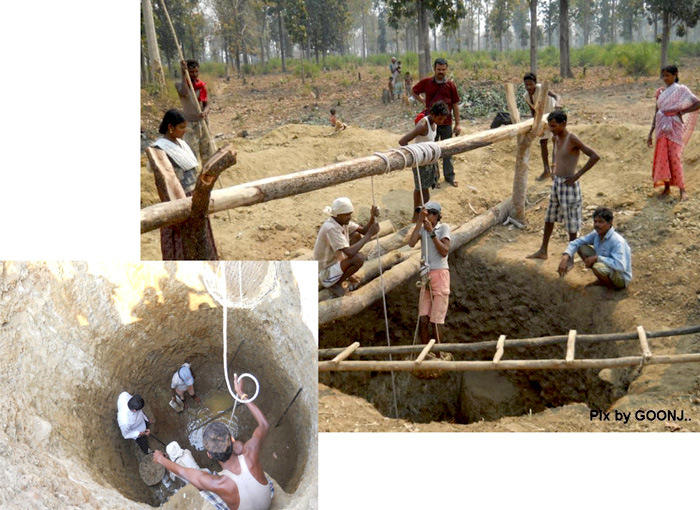
Well digging in Andhra Pradesh under ‘Cloth for Work’ initiative
Usually when people are ready to discard their clothes, they donate it to a charity. How did you change the mindset of urban dwellers around the issue of clothing and their concept of giving? And, how did you work with the village communities and convince them that they can work on their own issues in exchange for clothes via your cloth for work initiative?
The first effort is to change the thought process and vocabulary around this. To be honest when people like us say- ‘we want to donate cloth’ we are actually wrong and it is an over statement. The fact remains that we don’t donate, we discard. If we give 10 bucks or 10 kg of rice, we can call it donation but if I give my T-shirt after wearing it for months, is it really a donation? Rather we need to be thankful to the people who use it as they respect something which we would have thrown and give it a new life.
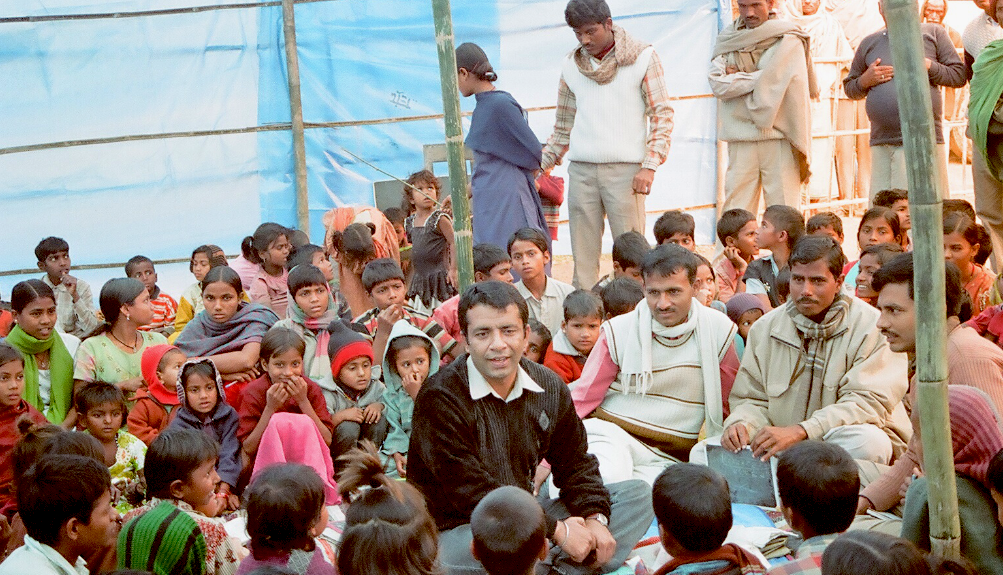
Anshu talking to people in the field
In some cities there are formal/informal channels to give away old material. We have just put in systems in that. We conveyed to the people how resourceful ‘material’ can become, how it can be used in a much more dignified manner, why it is important for people to give in a dignified manner, not give soiled or useless material, although that is still a problem. But largely things are changing. Right now we are dealing with almost 3,000 tonnes of material, and clothing is just a part of it. 40-50% is clothing; the rest is shoes, school supplies, windows, furniture etc.

Materials collected by Goonj include stationary, books, toys etc.
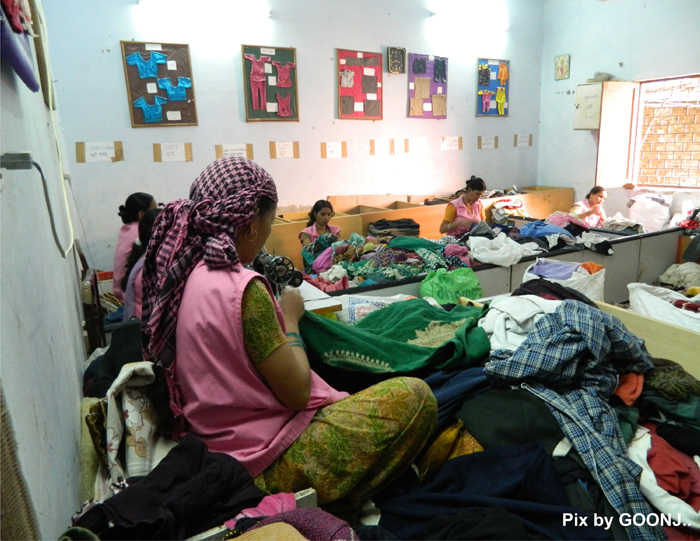
Processing centre, cloth sorting according to the size, gender etc.
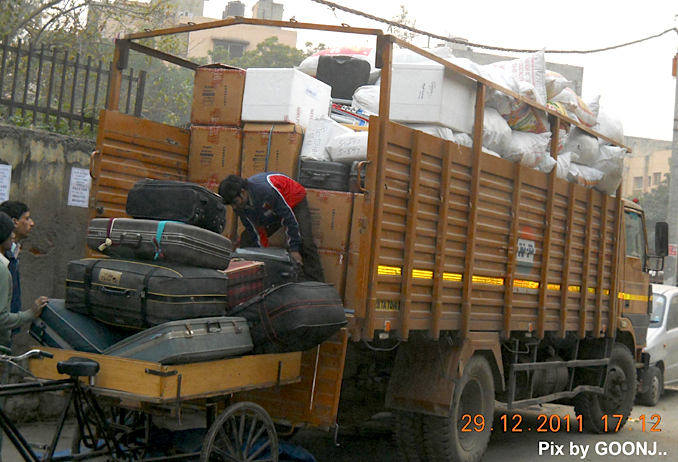
Dispatching the material
The biggest asset of villagers is dignity. That is why we always say that if you have to work with villagers it is extremely important to move out of the charity model. Make them a stakeholder; make them a part of the work, for them dignity matters a lot. That’s how this entire ‘Cloth For Work’ concept has built up, now people are addressing their own hardcore, infrastructure issues. And instead of money, they are rewarded with material, which in any case would have gone to people as charity, but now it’s no more a charity, but a very dignified dealing. We must understand that we don’t find beggars in the villages, begging is a city phenomena. It is important to keep the dignity of people intact and respect that.
Did you have resistance initially when you went to a poor person and said “do this work for us and instead of food, we will give you cloth”?
We don’t say that we will give you cloth in return for the work you do. That is not our language because that is not what we are doing. We are not contractors; we don’t say that you build a road and instead of money we will give you material. We are basically tackling a social, hardcore issue, where we are saying that there is an issue of lack of clothing. So there are two ways of receiving that, one is that you get it as charity. Tomorrow I come and put my hand on your shoulder and say that, the shirt you are wearing belongs to me, and the guy will not take it because there is self-respect. The second is that you don’t work for government, any organisation, or any Goonj, you work for yourself, you choose your own issues and work on them, and then you receive the same materials in exchange with a lot of dignity. Tomorrow if I say this shirt belongs to me, you can actually kick me out and say, “no, it might be yours but ultimately I have earned it”.
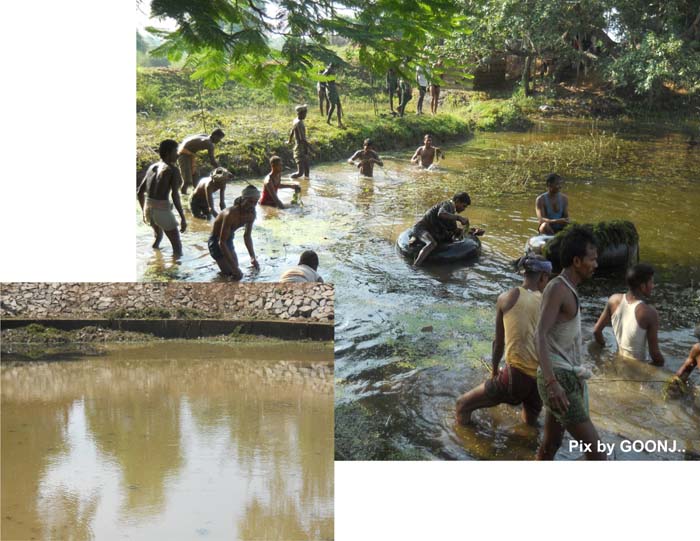
Pond cleaning in Odisha under ‘Cloth for Work’ initiative
Everyone can start a campaign, what does it take to make it a mass movement? You now have a thousand volunteers and Goonj is in twenty-one states. You initially started out as a campaign, what made it into a mass movement?
I think one is obviously your perseverance, and second most important is your openness. Instead of talking in the language – there is a donor, and there is a beneficiary, you make everyone a stakeholder. I think if you see the character of a movement, everyone is a stakeholder. As a result when the movement grows everyone fights for something, or becomes a part of something. I became a part of it because I loved it. I think that is how this has grown. Outcomes of various movements happen years later but in our case the outcome comes on a regular day-to-day basis. We have been able to bring the spirit of a movement just because everyone is a stakeholder here.
When you started Goonj what was your goal? Have you achieved it? What’s next for you personally and professionally?
When we started, to be honest we did not know what we were going to do and how big it’ll become. I just started working on something that was troubling me. There was an acute shortage of clothing and the solution was within us, we didn’t have to look outside. Eventually it took its own shape. So, the goal I will not say is fulfilled, because there is a lot to do, and maybe it will never be fulfilled, because everyday it becomes big. I think the biggest satisfaction is that the dream or the goal is in the right direction. That what you thought, you are able to grow, evolves and learn from, that’s a very fulfilling thing.
My personally, professionally, is all the same. I think Goonj is on its own path, it has taken shape, and a whole lot of people are there to take care of it. I spend a lot of time on Goonj, but I also spend a whole lot of time on non-Goonj activities, which are primarily talking to a whole lot of new people, working with them and making sure that more new ideas come up. Initiatives by youth are very dear to me. Youth don’t need just financial and other resources, they also need someone to come and put a hand on their shoulder and say yes this can be done. I like to provide those affirmative words to the youth. That’s a little role I try to play in my own capacity.
Share with us one failure and the lesson you learnt from it?
Failure has basically been in maybe the many approaches, which we took on making something happen. In most cases I will not call it failure, because you can only fail in something when you give it a 100% and then decide not to do it again. I don’t remember a case like that. In most cases we have given our 50% and then decided to change our approach. Implementation of school to school is one such example. We felt that all of our materials should be utilised as a motivational factor to the students, and it should not be given free of cost. But so far, our success is limited in that. Why? Because there is a huge ecosystem around us, a whole lot of people who are still promoting, giving everything free to kids, the so called ‘poor kid’. It unfortunately creates fierce competition between many approaches. I think the only solution to that is we work harder, and put in our message of dignity in a much bigger manner, so that people understand what we are talking about, and we should not make kids a victim of charity from the beginning of their life itself.
Social entrepreneurship has gained momentum over the past few years. What have you learnt from your entrepreneurial journey? One piece of advice you would give to budding social entrepreneurs?
Social entrepreneurship is an extremely encouraging and fulfilling journey for sure. What we have learnt and what I would like people to talk about and start working on, are issues which are bothering people, not just issues, which you discuss in your drawing room with advisors and some venture people. We need to work more on the hardcore issues instead of the superficial issues. If I talk about the budding entrepreneurs, they need to identify what are the non-issues and the issues, which are troubling the larger masses. We need to ask ourselves “where as an entrepreneur can I really do something which makes this survival easy?” I’m not here to add something in the life of people who are already leading an OK or a good life. Can I really target those people who are struggling to survive? Can I come up with more solutions for the water in the village? Can I have more replications of the ‘Jaipur Foot’? Or can I really solve the problem of urban waste, or rural toilet issues, there is a huge opportunity available here. And if you want you can even make profit by doing it ethically, because the volume is so big. And mind you if you want to be called an entrepreneur , you will still be called that ! It is about the issue that you want to work on.
Do you see Goonj being replicated in other countries especially in the west?
The problem is everywhere; the only difference is the proportion or scale of the problem. It’s not that there are no homeless people in New York or every single person is very well clothed in London, or in any other big city on this earth. The migrant communities all across the globe are most ignored communities. So let’s not talk about the volume of India, or Vietnam, or Bangladesh. Every single country has issues, and our solutions are not limited to cloth only. There’s a wrong notion about Goonj that we are in the business of collecting and distributing cloth. If you see the larger work of Goonj, it is that we have been able to value and create parallel currencies for development. Communities, which are part of this world ultimately, pay you back in a currency called ‘labor’. They are rewarded in a currency called ‘material’. We have been able to revive the barter system. The day you start valuing material, labor and so many other things as currency for development, the fight and struggle for so many of us even in the entrepreneurship circle will become much easier. Ours is not a charitable or development organisation only, it is a huge economic development model. I remember a few years back we were at NASA. NASA had chosen us as one of the nine game changing innovations across the globe. A very beautiful sentence that came up was “it is the genesis of a parallel economy which is not Cash-based but Trash based.” I think that is the ethos of our work. It is not just about collecting and distributing clothes.
Do Sayfty’s mission is to Educate, Equip and Empower women so that they can protect themselves against violence. What is your message for our readers related to women’s personal safety and the issue of violence against women?
I think women need to react. Till the time we just take the moral grounds and say one should not do this, and men should not be doing this, matters will not change. We have been doing that for many decades. Enough of talking like that. I think it is especially important for women and girls to react, demand and fight for their safety. The time has come when safety cannot be a charitable act of the government or families or men. It needs to be very bold, up front. Safety is a very basic human right. Women are asking for something very basic and it’s that simple. I think it’s important now to take some strong actions and woman should come up as a force. They have to be very assertive and they have to be at the forefront of it. Women’s issues like safety should not be limited to International Women’s Day or a discourse at some five-star hotel, or some conference somewhere. It needs to become a daily subject. It needs to be taken up as a subject or discussion in schools, colleges and institutions. People need to start talking and taking actions on the issue.
Anything else you wish to share with our readers?
In closing, the only thing I would like to say is, I think the world has enough thinkers, and eventually you don’t need thinkers anymore, you need doers. You need more action and more initiatives. The moment you add an act to a thought, it becomes an initiative. All of us have got one life and it’s extremely important for us to live that, and literally fulfill our dreams and do something. Do something for which the world knows us, or at least the people around us remember us. I have a simple mantra- “Lagey raho” – means keep doing!
Bio
Popularly known as the Clothing Man and recipient of 2015 Ramon Magsaysay Award, Anshu Gupta has studied Mass communication and has a Masters in Economics. Starting as a freelance journalist, Anshu left a corporate job in 1998 and founded Goonj with a mission to make clothing a matter of concern and to bring it among the list of subjects to work on, for the development sector. Under his leadership Goonj has taken the menacing growth of urban waste and used it efficiently as a tool to trigger large scale rural development work. By creating a barter between two new currencies; labor of the beneficiaries and old material of cities, Anshu has built the genesis of a parallel economy which is not cash based but trash based.
Anshu is an Ashoka and Schwab Fellow apart from being a member of the Humanitarian Crisis Council of the World Economic Forum and has been listed by the Forbes magazine as one of India’s most powerful rural entrepreneurs. Anshu brings to the table an instinctive empathy and connect with people by dignifying the act of giving. In the macro picture Anshu has identified some basic needs outside the radar screen of the development sector and the civil society, that too by structuring imaginative solutions using urban waste.
An entrepreneur at heart, avid traveler, photographer and a journalist by training, Anshu often pens prose and poetry, giving vent to his feelings and opinions on the issues that bother him about the world around him.